Unit-4-Fun.-Oh-Boy.-Fun.-You-Could-Die-from-It.课文翻译综合教程三名师优质资料
论综英课前warm-up的重要性
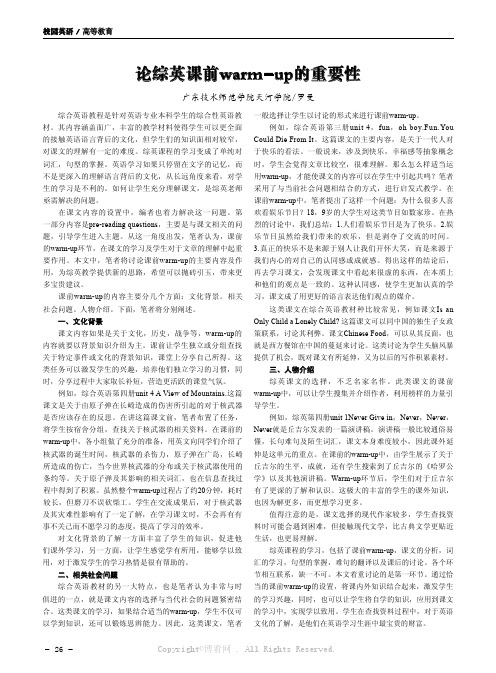
- 26 -校园英语 /高等教育论综英课前warm-up的重要性广东技术师范学院天河学院/罗曼综合英语教程是针对英语专业本科学生的综合性英语教材。
其内容涵盖面广,丰富的教学材料使得学生可以更全面的接触英语语言背后的文化,但学生们的知识面相对较窄,对课文的理解有一定的难度。
综英课程的学习变成了单纯对词汇,句型的掌握。
英语学习如果只停留在文字的记忆,而不是更深入的理解语言背后的文化,从长远角度来看,对学生的学习是不利的。
如何让学生充分理解课文,是综英老师亟需解决的问题。
在课文内容的设置中,编者也着力解决这一问题。
第一部分内容是pre-reading questions ,主要是与课文相关的问题,引导学生进入主题。
从这一角度出发,笔者认为,课前的warm-up 环节,在课文的学习及学生对于文章的理解中起重要作用。
本文中,笔者将讨论课前warm-up 的主要内容及作用,为综英教学提供新的思路,希望可以抛砖引玉,带来更多宝贵建议。
课前warm-up 的内容主要分几个方面:文化背景。
相关社会问题。
人物介绍。
下面,笔者将分别阐述。
一、文化背景课文内容如果是关于文化,历史,战争等,warm-up 的内容就要以背景知识介绍为主。
课前让学生独立或分组查找关于特定事件或文化的背景知识,课堂上分享自己所得。
这类任务可以激发学生的兴趣,培养他们独立学习的习惯,同时,分享过程中大家取长补短,营造更活跃的课堂气氛。
例如,综合英语第四册unit 4 A View of Mountains.这篇课文是关于由原子弹在长崎造成的伤害所引起的对于核武器是否应该存在的反思。
在讲这篇课文前,笔者布置了任务,将学生按宿舍分组,查找关于核武器的相关资料。
在课前的warm-up 中,各小组做了充分的准备,用英文向同学们介绍了核武器的诞生时间,核武器的杀伤力,原子弹在广岛,长崎所造成的伤亡,当今世界核武器的分布或关于核武器使用的条约等。
关于原子弹及其影响的相关词汇,也在信息查找过程中得到了积累。
unit4 fun, oh, boy
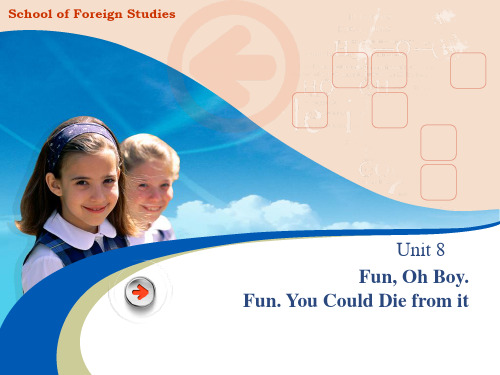
Puritans 清教徒
Puritans refer to a group of radical English Protestants that arose in the late 16th century and became a major force in England during the 17th century. Puritans wanted to purify the Church of England by eliminating traces of its origins in the Roman Catholic Church. In addition, they urged a strict moral code and placed a high value on hard work. After the execution of King Charles I in 1649, they controlled the new government, the Commonwealth. Oliver Cromwell, who became leader of the Commonwealth, is the best-known Puritan. Many Puritans, persecuted in their homeland, came to America in 1620s and 1630s, settling colonies that eventually became Massachusetts. The words puritan and puritanical have come to suggest a zeal for keeping people from enjoying themselves.
最新Unit 4 Fun. Oh Boy. Fun. You Could Die from It.课文翻译综合教程三名师优质制作教学资料

Unit 4Fun, Oh Boy. Fun. You Could Die from itSuzanne Britt Jordan1Fun is hard to have.2Fun is a rare jewel.3Somewhere along the line people got the modern idea that fun was there for the asking, that people des erved fun, that if we didn’t have a little fun every day we would turn into (sakes alive!) puritans.4 “Was it fun?” became the question that overshadowed all other questions: good questions like: Was it moral? Was it kind? Was it honest? Was it beneficial? Was it generous? Was it necessary? And (my favorite) was it selfless?5 When the pleasures got to be the main thing, the fun fetish was sure to follow. Everything was supposed to be fun. If it wasn’t fun, then by Jove, we were going to make it fun, or else.6 Think of all the things that got the reputation of being fun. Family outings were supposed to be fun. Sex was supposed to be fun. Education was supposed to be fun. Work was supposed to be fun. Walt Disney was supposed to be fun. Church was supposed to be fun. Staying fit was supposed to be fun.7 Just to make sure that everybody knew how much fun we were having, we put happy faces on flunking test papers, dirty bumpers, sticky refrigerator doors, bathroom mirrors.8 If a kid, looking at his very happy parents traipsing through that very happy Disney World, said, “This ain’t fun, ma,” his ma’s heart sank. She wondered where she had gone wrong. Everybody told her what fun family outings to Disney World would be. Golly gee, what was the matter?9 Fun got to be such a big thing that everybody started to look for more and more thrilling ways to supply it. One way was to step up the level of danger or licentiousness or alcohol or drug consumption so that you could be sure that, no matter what, you would manage to have a little fun.10 Television commercials brought a lot of fun and fun-loving folks into the picture. Everything that people in those commercials did looked like fun: taking Polaroid snapshots, swilling beer, buying insurance, mopping the floor, bowling, taking aspirin. We all wished, I’m sure, that we could have half as much fun as those rough-and-ready guys around the locker room, flicking each other with towels and pouring champagne.The more commercials people watched, the more they wondered when the fun would start in their own lives. It was pretty depressing.11 Big occasions were supposed to be fun. Christmas, Thanksgiving and Easter were obviously supposed to be fun. Your wedding day was supposed to be fun. Your wedding night was supposed to be a whole lot of fun. Your honeymoon was supposed to be the epitome of fundom. And so we ended up going through every Big Event we ever celebrated, waiting for the fun to start.12 It occurred to me, while I was sitting around waiting for the fun to start, that not much is, and that I should tell you just in case you’re worried about your fun capacity.13 I don’t mean to put a damper on things. I just mean we ought to treat fun reverently. It is a mystery. It cannot be caught like a virus. It cannot be trapped like an animal. The god of mirth is paying us back for all those years of thinking fun was everywhere by refusing to come to our party. I don’t want to blaspheme fun anymore. When fun comes in on little dancing feet, you probably won’t be expecting it. In fact, I bet it comes when you’re doing your duty, your job, or your work. It may even come ona Tuesday.14 I remember one day, long ago, on which I had an especially good time. Pam Davis and I walked to the College Village drug store one Saturday morning to buy some candy. We were about 12 years old (fun ages). She got her Bit-O-Honey. I got my malted milk balls, chocolate stars, Chunkys, and a small bag of M & M’s. We started back to her house. I was going to spend the night. We had the whole day to look forward to. We had plenty of candy. It was a long way to Pam’s house but every time we got weary Pam would put her hand over her eyes, scan the horizon like a sailor and say, “Oughta reach home by nightfall,” at which point the two of us would laugh until we thought we couldn’t stand it another minute. Then after we got calm, she’d say it again. You should have been there. It was the kind of day and friendship and occasion that made me deeply regretful that I had to grow up.15 It was fun.乐趣,啊,乐趣。
Fun(1)

Paragraphs 6-11 body part:
The writer offers an extended definition of the word “fun” by pointing out what it is not. 1. What are some of the things that do not provide fun according to Jordan? 2. How do people manage to have fun? 3. What’s the relationship between big occasions and the experience of fun? With high expectations for fun, people are not content with the joy that big occasions such as holidays, weddings or birthdays bring them.
P3 somewhere along the line -- during the time when you are involved in an activity or process e.g. Somewhere along the line, his father became addicted to gambling in Las Vegas.
Oliver Cromwell, who became leader of the Commonwealth, is the best-known Puritan. Many puritans, persecuted in their homeland, came to America in the 1620s and 1630s, setting colonies that eventually became Massachusetts.
Unit 4 Fun, Oh Boy. Fun. You Could Die from it. Teaching plan综合教程三
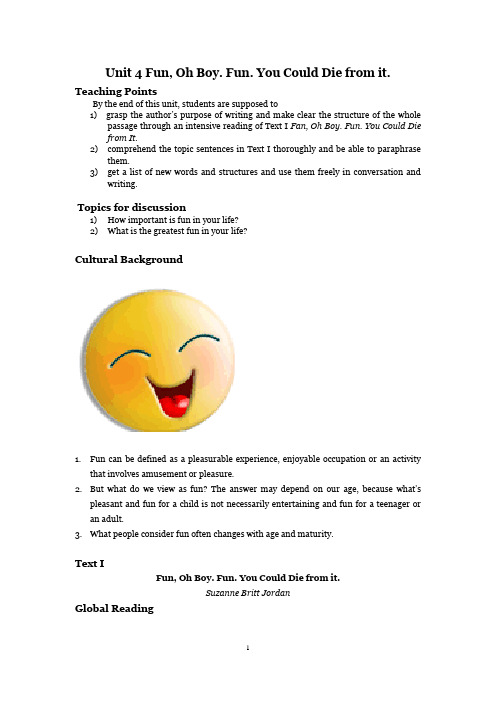
Unit 4 Fun, Oh Boy. Fun. You Could Die from it. Teaching PointsBy the end of this unit, students are supposed to1)grasp the author’s purpose of writing and make clear the structure of the wholepassage through an intensive reading of Text I Fan, Oh Boy. Fun. You Could Die from It.2)comprehend the topic sentences in Text I thoroughly and be able to paraphrasethem.3)get a list of new words and structures and use them freely in conversation andwriting.Topics for discussion1)How important is fun in your life?2)What is the greatest fun in your life?Cultural Background1.Fun can be defined as a pleasurable experience, enjoyable occupation or an activitythat involves amusement or pleasure.2.But what do we view as fun? The answer may depend on our age, because what'spleasant and fun for a child is not necessarily entertaining and fun for a teenager or an adult.3.What people consider fun often changes with age and maturity.Text IFun, Oh Boy. Fun. You Could Die from it.Suzanne Britt JordanGlobal ReadingI. Text AnalysisMain Idea●In this text, the author challenges the modern idea that fun is there for the askingand that fun overshadows everything.●The author argues, instead, that fun is hard to have and that fun is a rare jewel.II. Structural AnalysisPart 1 (Paragraphs 1-5) introduces the thesis of the essay: Fun is hard to have. Fun is a rare jewel.Part 2 (Paragraphs 6-11) points out a prevalent misconception, and consequences thereof, that everything is supposed to be fun.Part 3 (Paragraphs 12-15) is the concluding part of the essay where the author suggests that we ought to treat fun reverently.Detailed ReadingQuestions1) What is the thesis statement of the essay? (paragraph 1-2)Fun is hard to have. Fun is a rare jewel.2) In Paragraph 4, a series of questions has been raised. What’s the effect of it? (Paragraph 4)Here, by making a startling statement (the question “Was it fun?” overshadowed all other questions) and raising a series of questions, Jordan points out that fun has become the major concern of people. It has outweighed many other questions.3) What are some of the things that do not provide fun according to Jordan ? (Paragraph 7)Failing in a test, dirty bumpers, sticky refrigerator doors are some of the things that are not sources of fun.4) What relationship does the use of drugs and alcohol have to our difficulties in having fun today? (Paragraph 9)Today as people live under unprecedented stress, they can hardly relax and the monotonous routine work is not in the least exciting for them. Only when they indulge themselves in drugs and alcohol can they forget the worries of the day and have a little fun.5) What is the relationship between big occasions and the experience of fun? (Paragraph 11)With high expectations for fun, people are not contented with the joy that big occasions such as holidays, weddings or birthdays bring them. To make up for the inadequacy of fun and joy, they are still expecting the next big occasion which might bring them excitement.6) How does Jordan develop Paragraph 13? (Paragraph 13)To develop the idea, the author uses definition: “it is a mystery”, and comparison and contrast. Some figurative techniques are employed to further define what fun is, which include personification: “When fun comes in on little dancing feet, you probably won’t be expecting it.” and simile: “It cannot be caught like a virus. It cannot be trapped like an animal.”7) What does “It may even come on a Tuesday” m ean? (Paragraph 13)Tuesday is a workday, the day following the blue Monday. It is commonly regarded as an ordinary day when everyone is supposed to be doing the routine work. As a rule, no holidays, no big occasions would take place on this day. But if we treat fun properly, we can have fun even on such an ordinary day.8) Why does Jordan use an anecdote to conclude her essay? (Paragraph 14)Here Jordan suggests that it is easier for children to have fun than it is for grown-ups.Text IIThe Age of ThrillsRobert LyndLead-in QuestionsWhat is the essence of happiness? Can thrills bring us happiness?●Happiness is not rooted in thrills, which are merely amusements.●Happiness chiefly derives from affection for people and interest in various objects inthe external world.●It is the simple joy in life rather than the thrilling experience that provides us withhappiness, which is deep and lasting.●And those who are truly happy do not depend on thrills for their happiness, forthrills can only help to get rid of the feeling of boredom.Main ideaThe Age of Thrill tells us our age is the age of thrill. It generates many more thrills than any of the previous ages did and people in our age expect to be thrilled as continuously as people in no other ages did. Happiness is not rooted in thrills, which are merely amusements. Happiness chiefly derives from affection for people and interest in various objects in the external world. Those who are truly happy do not dependent on thrills for their happiness, for thrills can only help to get rid of the feeling of boredom.Notes1.About the author: Robert Wilson Lynd (1879-1949) was an Irish writer, an urbaneliterary essayist and strong Irish nationalist. He is remembered today for numerous essays of elegance and fluency.2.Colosseum (Paragraph 1) The Colosseum or Roman Coliseum, originally the FlavianAmphitheatre, is an elliptical amphitheatre in the center of the city of Rome, Italy, the largest ever built in the Roman Empire.3.Tarzans and Sheiks(Paragraph 1) Tarzan is a fictional character, an archetypalferal child raised in the African jungle by apes, who later returns to civilization only to largely reject it and return to the wild as a heroic adventurer. Created by Edgar Rice Burroughs, Tarzan first appeared in the novel Tarzan of the Apes(magazine publication 1912, book publication 1914), and then in twenty-three sequels and innumerable works in other media. Sheik, head of Arabian tribe, or African jungle tribe or village, is another character in the story of Tarzan. And Tarzans and Sheiks, in their plural forms, refer to adventure stories in publication in general.4.Virgil (Paragraph 1) Virgil, or Publius Vergilius Maro (October 15, 70 BC-September21, 19 BC), was a classical Roman poet, best known for three major works —the Bucolics, the Georgics and the Aeneid —although several minor poems are also attributed to him. The son of a farmer, Virgil came to be regarded as one of Rome's greatest poets and his Aeneid as Rome's national epic.5.Caesar (Paragraph 1) Gaius Julius Caesar (100 BC-44BC), was a Roman military andpolitical leader. He played a critical role in the transformation of the Roman Republic into the Roman Empire.6.Zeppelin(Paragraph 2) A Zeppelin is a type of rigid airship pioneered by theGerman Count Ferdinand von Zeppelin in the early 20th century, based on designs he had outlined in 1874, and detailed in 1893. Due to the outstanding success of the Zeppelin design, the term zeppelin in casual use came to refer to all rigid airships.After the outbreak of World War I, the German military made extensive use of Zeppelins as bombers and scouts.7.Charles Lamb’s tenderest essay was called Old China(Paragraph 3) CharlesLamb (1775 -1834) was an English/Welsh essayist, best known for his Essays of Elia and for the children's book Tales from Shakespeare, which he produced with his sister, Mary Lamb (1764-1847). Lamb has been called the most lovable figure in English literature, and his influence on the English essay form surely cannot be overestimated. Old China is an essay included in the Essays of Elia.8.Guy Boothby(Paragraph 4) Guy Newell Boothby (1867-1905) was an Australiannovelist and writer. Some of Boothby's earlier works relate to stories of Australian life, but later he turned to genre fiction. He was once well known for his series of five novels about Doctor Nikola, an occultist anti-hero seeking immortality and world domination.9.Jane Austen(Paragraph 4) Jane Austen (1775-1817) was one of the most widelyread and most beloved writers in English literature. She is best known for novels Sense and Sensibility (1811), Pride and Prejudice (1813) and Emma (1815).Questions for Discussion1.What, according to the author, is the most distinctive feature of our age?2.What is the difference of great books and thrilling books?3.Should we deny ourselves entirely the excitement of thrills?Reference answers1. Our age, according to the author, is the age of thrills. It generates many more thrills than any of the previous ages did and people in our age expect to be thrilled as continuously as people in no other ages did. We have cinemas running all day long, publishing houses pouring out thousands upon thousands of thrillers every day and various devices of excitements of speed. We are by no means short of a diversity and variety of thrills.2. Great books bring us exaltations while thrilling books only excite our nerves superficially; great books inspire imagination and affection while thrilling books can hardly do so. Great books can help us to gain an insight into the reality, into the essence of life, into the nature of human beings and into the truth of the universe while thrilling books can help us escape from reality and worries in life for some time.3. We, as human beings, can enjoy thrills occasionally, for various forms of thrills can serve as a kind of spice in life, but what is important is that we should learn to derive our pleasures from simple things in life so as to feel truly happy. In addition, if we learn how to bear a certain degree of boredom, we may enjoy life more intensely.Memorable QuotesTo love what you do and feel that it matters — how could anything be more fun?—Katharine GrahamA great obstacle to happiness is to anticipate too great a happiness.—FontenelleKatharine Meyer Graham (June 16, 1917-July 17, 2001) was an American publisher. She led her family's newspaper, The Washington Post, for more than two decades, overseeing its most famous period, the Watergate coverage that eventually led to the resignation of President Richard Nixon. Her memoir, Personal History, won the Pulitzer Prize in 1998.Bernard le Bovier de Fontenelle (11 February 1657-9 January 1757), also called Bernard le Bouyer de Fontenelle, was a French author.A DebateDivide the students into two groups, with two opposite opinions on the topic of the text. Their stands can be “P eople have to rely on thrilling things to have fun in life”, and “People can have fun in their daily routines instead of relying on outside stimulations.”. Viewpoints:●Have fun in your command. Don’t always run at a breakneck pace. Take leave whenyou’ve earned it and spend time with your families.●You gotta have fun. Regardless of how you look at it, we’re playing a game. It’s abusiness, it’s our job, but I don’t think you can do well unless you’re having fun.●Creative ideas flourish best in a shop which preserves some spirit of fun. Nobody isin business for fun, but that does not mean there cannot be fun in business.If a man insisted always on being serious, and never allowed himself a bit of fun and relaxation, he would go mad or become unstable without knowing it.。
unit 4 fun, oh boy. fun you could die from it
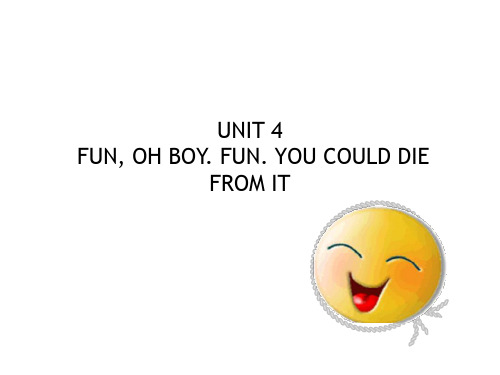
with age and maturity.
Text Analysis
Structural Analysis
What is the main idea of the text? • In this text, the author challenges the modern idea that fun is there for the asking and that fun overshadows everything. • The author argues, instead, that fun is hard to have and that fun is a rare jewel.
Detailed Reading
take vengeance on/ revenge on
The god of mirth is paying us back for all those years of thinking fun was everywhere by refusing to come to our party. (Paragraph 13) Paraphrase: We have long assumed that fun was easy to have, but now we are paying a price for the misconception, i.e., our party is hardly as much fun as we has expected it to be.
Detailed Reading
blaspheme v. show contempt or disrespect for (God, a divine being, or sacred things)
unit4fun.ohboy.fun.youcoulddiefromit.课文翻译综合教程三
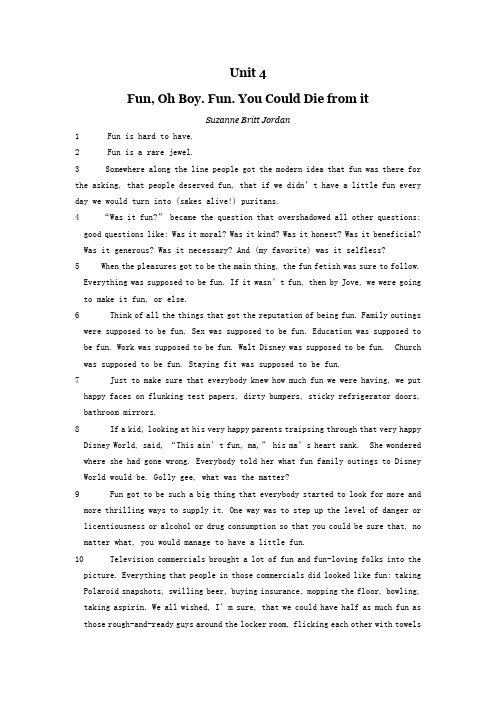
Unit 4Fun, Oh Boy. Fun. You Could Die from itSuzanne Britt Jordan1Fun is hard to have.2Fun is a rare jewel.3 Somewhere along the line people got the modern idea that fun was there for the asking, that people deserved fun, that if we didn’t have a litt le fun every day we would turn into (sakes alive!) puritans.4 “Was it fun?” became the question that overshadowed all other questions: good questions like: Was it moral? Was it kind? Was it honest? Was it beneficial? Was it generous? Was it necessary? And (my favorite) was it selfless?5 When the pleasures got to be the main thing, the fun fetish was sure to follow. Everything was supposed to be fun. If it wasn’t fun, then by Jove, we were going to make it fun, or else.6 Think of all the things that got the reputation of being fun. Family outings were supposed to be fun. Sex was supposed to be fun. Education was supposed to be fun. Work was supposed to be fun. Walt Disney was supposed to be fun. Church was supposed to be fun. Staying fit was supposed to be fun.7 Just to make sure that everybody knew how much fun we were having, we put happy faces on flunking test papers, dirty bumpers, sticky refrigerator doors, bathroom mirrors.8 If a kid, looking at his very happy parents traipsing through that very happy Disney World, said, “This ain’t fun, ma,” his ma’s heart sank. She wondered where she had gone wrong. Everybody told her what fun family outings to Disney World would be. Golly gee, what was the matter?9 Fun got to be such a big thing that everybody started to look for more and more thrilling ways to supply it. One way was to step up the level of danger or licentiousness or alcohol or drug consumption so that you could be sure that, no matter what, you would manage to have a little fun.10 Television commercials brought a lot of fun and fun-loving folks into the picture. Everything that people in those commercials did looked like fun: taking Polaroid snapshots, swilling beer, buying insurance, mopping the floor, bowling, taking aspirin. We all wished, I’m sure, that we could have half as much fun as those rough-and-ready guys around the locker room, flicking each other with towelsand pouring champagne. The more commercials people watched, the more they wondered when the fun would start in their own lives. It was pretty depressing.11 Big occasions were supposed to be fun. Christmas, Thanksgiving and Easter were obviously supposed to be fun. Your wedding day was supposed to be fun. Your wedding night was supposed to be a whole lot of fun. Your honeymoon was supposed to be the epitome of fundom. And so we ended up going through every Big Event we ever celebrated, waiting for the fun to start.12 It occurred to me, while I was sitting around waiting for the fun to start, that not mu ch is, and that I should tell you just in case you’re worried about your fun capacity.13 I don’t mean to put a damper on things. I just mean we ought to treat fun reverently. It is a mystery. It cannot be caught like a virus. It cannot be trapped like an animal. The god of mirth is paying us back for all those years of thinking fun was everywhere by refusing to come to our party. I don’t want to blaspheme fun anymore. When fun comes in on little dancing feet, you probably won’t be expecting it. In fact, I bet it comes when you’re doing your duty, your job, or your work. It may even come on a Tuesday.14 I remember one day, long ago, on which I had an especially good time. Pam Davis and I walked to the College Village drug store one Saturday morning to buy some candy. We were about 12 years old (fun ages). She got her Bit-O-Honey.I got my malted milk balls, chocolate stars, Chunkys, and a small bag of M & M’s. We started back to her house. I was going to spend the night. We had the whole day t o look forward to. We had plenty of candy. It was a long way to Pam’s house but every time we got weary Pam would put her hand over her eyes, scan the horizon like a sailor and say, “Oughta reach home by nightfall,” at which point the two of us would laug h until we thought we couldn’t stand it another minute. Then after we got calm, she’d say it again. You should have been there. It was the kind of day and friendship and occasion that made me deeply regretful that I had to grow up.15 It was fun.乐趣,啊,乐趣。
Unit4Fun,oh,boy,fun,youcoulddiefromit.练习答案解析综合教程三
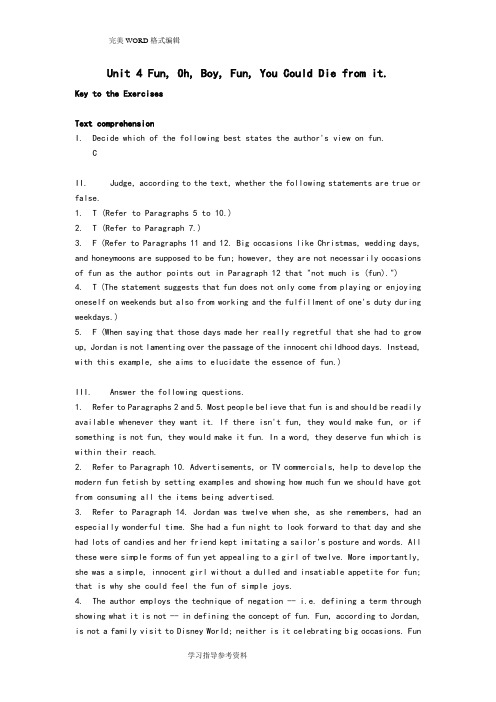
Unit 4 Fun, Oh, Boy, Fun, You Could Die from it.Key to the ExercisesText comprehensionI. Decide which of the following best states the author's view on fun.CII. Judge, according to the text, whether the following statements are true or false.1. T (Refer to Paragraphs 5 to 10.)2. T (Refer to Paragraph 7.)3. F (Refer to Paragraphs 11 and 12. Big occasions like Christmas, wedding days, and honeymoons are supposed to be fun; however, they are not necessarily occasions of fun as the author points out in Paragraph 12 that "not much is (fun).")4. T (The statement suggests that fun does not only come from playing or enjoying oneself on weekends but also from working and the fulfillment of one's duty during weekdays.)5. F (When saying that those days made her really regretful that she had to grow up, Jordan is not lamenting over the passage of the innocent childhood days. Instead, with this example, she aims to elucidate the essence of fun.)III. Answer the following questions.1. Refer to Paragraphs 2 and 5. Most people believe that fun is and should be readily available whenever they want it. If there isn't fun, they would make fun, or if something is not fun, they would make it fun. In a word, they deserve fun which is within their reach.2. Refer to Paragraph 10. Advertisements, or TV commercials, help to develop the modern fun fetish by setting examples and showing how much fun we should have got from consuming all the items being advertised.3. Refer to Paragraph 14. Jordan was twelve when she, as she remembers, had an especially wonderful time. She had a fun night to look forward to that day and she had lots of candies and her friend kept imitating a sailor's posture and words. All these were simple forms of fun yet appealing to a girl of twelve. More importantly, she was a simple, innocent girl without a dulled and insatiable appetite for fun; that is why she could feel the fun of simple joys.4. The author employs the technique of negation -- i.e. defining a term through showing what it is not -- in defining the concept of fun. Fun, according to Jordan, is not a family visit to Disney World; neither is it celebrating big occasions. Funis in simple pleasures of life which lie rather in one's work and the fulfillment of one's duty.5. An open question; answers may vary.IV. Explain in your own words the following sentences.1. Nowadays, people believe that they can have fun whenever they want it, and that they should have fun; otherwise they would be leading a dull and bitter life as a puritan.2. We have long assumed that fun was easy to have, but now we are paying a price for that shallow-mindedness, i.e., our party is hardly as much fun as it is expected to be.Structural analysis of the textParagraph 12 is the turning point where the writer switches from negation to affirmation. With the last three paragraphs presented mostly affirmatively, the tone is thus turned from irony to matter-of-factness.Rhetorical features of the textHere is another example: "Think of all the things that got the reputation of being fun. Family outings were supposed to be fun. Sex was supposed to be fun. Education was supposed to be fun. Work was supposed to be fun. Walt Disney was supposed to be fun. Church was supposed to be fun. Staying fit was supposed to be fun." (Paragraph 6) The underlined part in the quotation displays the repetition of the pattern: "?was supposed to be fun," which shows, by way of illustration, how one might spare no effort to find fun in everything.Vocabulary exercisesI. Explain the underlined part in each sentence in your own words.1. we would be morally too strict with ourselves to enjoy life2. that made all other questions less significant3. counting fun as the most important quality of life4. the best example of having fun5. by nothing more than simple exposureII. Fill in the blank in each sentence with a word taken from the box in its appropriate form.1. overshadows2. traipse3. fetish4. flunked5. swilling6. flicked7. epitome 8. licentiousnessIII. Fill in the blanks with the appropriate forms of the given words.1. insured2. undeserved3. generosity4. benefits5. regrettable6. mirthful7. blasphemy 8. reverenceIV. Fill in the blank(s) in each sentence with an appropriate phrasal verb or collocation taken from the text.1. turn into2. occurred to3. end up4. step up5. pay, back6. look forward to7. look for8. managed toV. Give a synonym or an antonym of the word underlined in each sentence in the sense it is used.1. Synonym: excursion (jaunt)2. Synonym: failing3. Antonym: irreverently (disrespectfully, contemptuously)4. Synonym: advertisements5. Synonym: quintessence (embodiment)6. Antonym: grief (sadness, melancholy)7. Synonym: profane (revile)8. Synonym: examine (scrutinize)VI. Explain the underlined phrasal verbs in your own words.1. drew attention to2. represents3. fully explain4. challenged by5. support6. bored7. be well understood 8. visitedGrammar exercisesI. Use the words in brackets to link the cause and effect in the following sentences.1. Since everybody says Woody Allen's latest film is good, I think I'll go and seeit.2. All of us were very excited because the departure was approaching.3. The excitement will be so great that nobody will be able to sleep.4. As Mr. Jordan liked Morocco very much when he first went there, he wants to go there again.5. This album of Bruce Springsteen sounds exciting, so we are thinking of buying it.6. My wife coughed a lot last night. As a result, she is thinking of giving up smoking for a while.7. Seeing that the students were not interested, Professor Jones ended the seminar.8. I feel much better now that I've talked to you.II. Make sentences, linking the openings on the left with the conclusions on the right. Use the linking expressions in the middle.1. New investment has been made in order that roads can be improved.2. Being late, she took a taxi so as not to lose time.3. Audiovisual equipment is often used for language learning.4. She never walked through the park for fear that she might meet him again.5. She decided to move to London so that she could be near her child.6. She'll be at the airport in order to meet the new tourist group.7. Take your passport in case they ask for identification.8. She goes to work by bus to avoid using the car.III. Correct the errors, where found, in the following sentences.1. it all happened→did it all happen(When "So+adverb/adjective" begins a sentence, we should use the inverted order.)2. because→because of(Because of is used before a noun, gerund or noun phrase while because beforea clause.)3. guarantee→guaranteeing(Here thereby introduces an ing-clause.)4. such shock→such a shock(Shock here is singular, so an article is needed.)5. For he had no convincing explanation for his actions, they found him guilty.→They found him guilty for he had no convincing explanation for his actions.(We usually don't place the for-clause at the sentence initial position.) 6. learnt→could learn(The adverbial clause of purpose introduced by in order that usually containsa modal.)7. about it→about that it(In the construction so?that, so is a modifier and a that-clause acts as a qualifier.)8. in order that they→in order to / in order that they couldIV. Complete the following sentences with the words and phrases in the box.1. such ... that2. thus3. in that4. With5. so ... that6. Owing to7. for8. Seeing thatV. Complete the following letter with the appropriate forms of the verbs given. should/would like have ... heardwould ... suit doesn't applywon't get sawhad/was ... left/leaving saidwas going promised(had) found have hearddon't know wentknow should/would bewould phone have trieddoesn't seemVI. Make sentences of your own after the sentences given below, keeping the italicized parts in your sentences.1. e.g. This machine is not supposed to make so much noise.He was supposed to be a college graduate but he doesn't seem to have any knowledge of history.2. e.g. I was having such a wonderful time that I didn't want to leave.There was such a big crowd at the movie house that we had to wait half an hour before we could get in.Translation exercisesI. Translate the following sentences into Chinese.1. “好玩吗?”这一问题已经使得其他一切问题相形失色,比如说:“道德吗?”“仁慈吗?”“诚实吗?”“有益吗?”“慷慨吗?”“有必要吗?”和(我最喜欢的)“无私吗?”等一些有意义的问题。
- 1、下载文档前请自行甄别文档内容的完整性,平台不提供额外的编辑、内容补充、找答案等附加服务。
- 2、"仅部分预览"的文档,不可在线预览部分如存在完整性等问题,可反馈申请退款(可完整预览的文档不适用该条件!)。
- 3、如文档侵犯您的权益,请联系客服反馈,我们会尽快为您处理(人工客服工作时间:9:00-18:30)。
Unit 4
Fun, Oh Boy. Fun. You Could Die from it
Suzanne Britt Jordan
1Fun is hard to have.
2Fun is a rare jewel.
3Somewhere along the line people got the modern idea that fun was there for the
have a little fun every day we would asking, that people des erved fun, that if we didn’t
turn into (sakes alive!) puritans.
4 “Was it fun?”
became the question that overshadowed all other questions: good questions like: Was it moral? Was it kind? Was it honest? Was it beneficial? Was it generous? Was it necessary? And (my favorite) was it selfless?
5 When the pleasures got to be the main thing, the fun fetish was sure to follow.
Everything was supposed to be fun. If it wasn’t fun, then by Jove, we were going to make it fun, or else.
6 Think of all the things that got the reputation of being fun. Family outings were
supposed to be fun. Sex was supposed to be fun. Education was supposed to be fun.
Work was supposed to be fun. Walt Disney was supposed to be fun. Church was supposed to be fun. Staying fit was supposed to be fun.
7 Just to make sure that everybody knew how much fun we were having, we put
happy faces on flunking test papers, dirty bumpers, sticky refrigerator doors, bathroom
mirrors.
8 If a kid, looking at his very happy parents traipsing through that very happy
Disney World, said, “This a in’t fun, ma,” h is ma’s heart sank. She wondered where she had gone wrong. Everybody told her what fun family outings to Disney World would be. Golly gee, what was the matter?
9 Fun got to be such a big thing that everybody started to look for more and more
thrilling ways to supply it. One way was to step up the level of danger or licentiousness
or alcohol or drug consumption so that you could be sure that, no matter what, you would manage to have a little fun.
10 Television commercials brought a lot of fun and fun-loving folks into the picture.
Everything that people in those commercials did looked like fun: taking Polaroid snapshots, swilling beer, buying insurance, mopping the floor, bowling, taking aspirin.
We all wished, I’m sure, that we could have half as much fun as those rough-and-ready guys around the locker room, flicking each other with towels and pouring champagne.。
